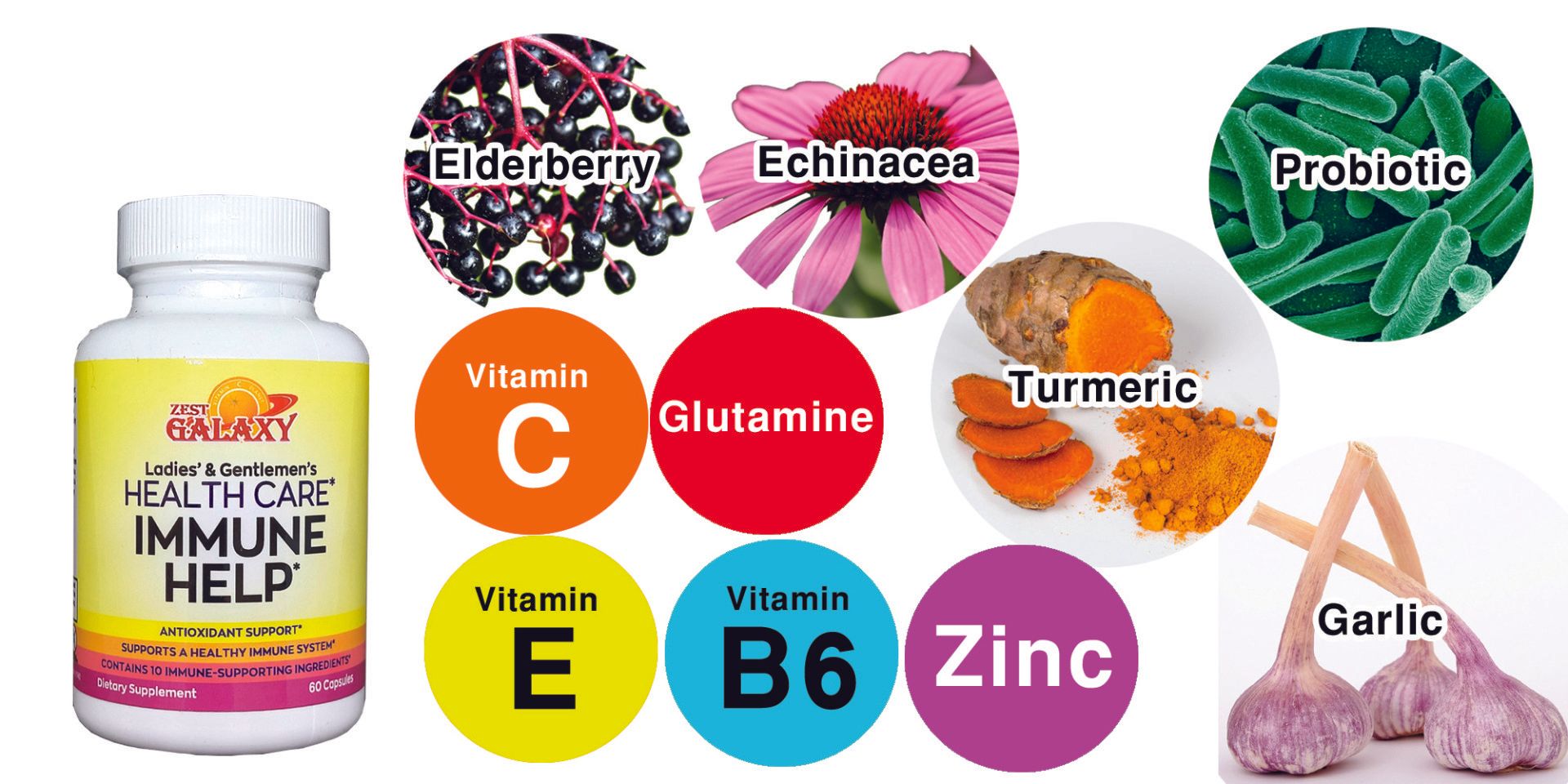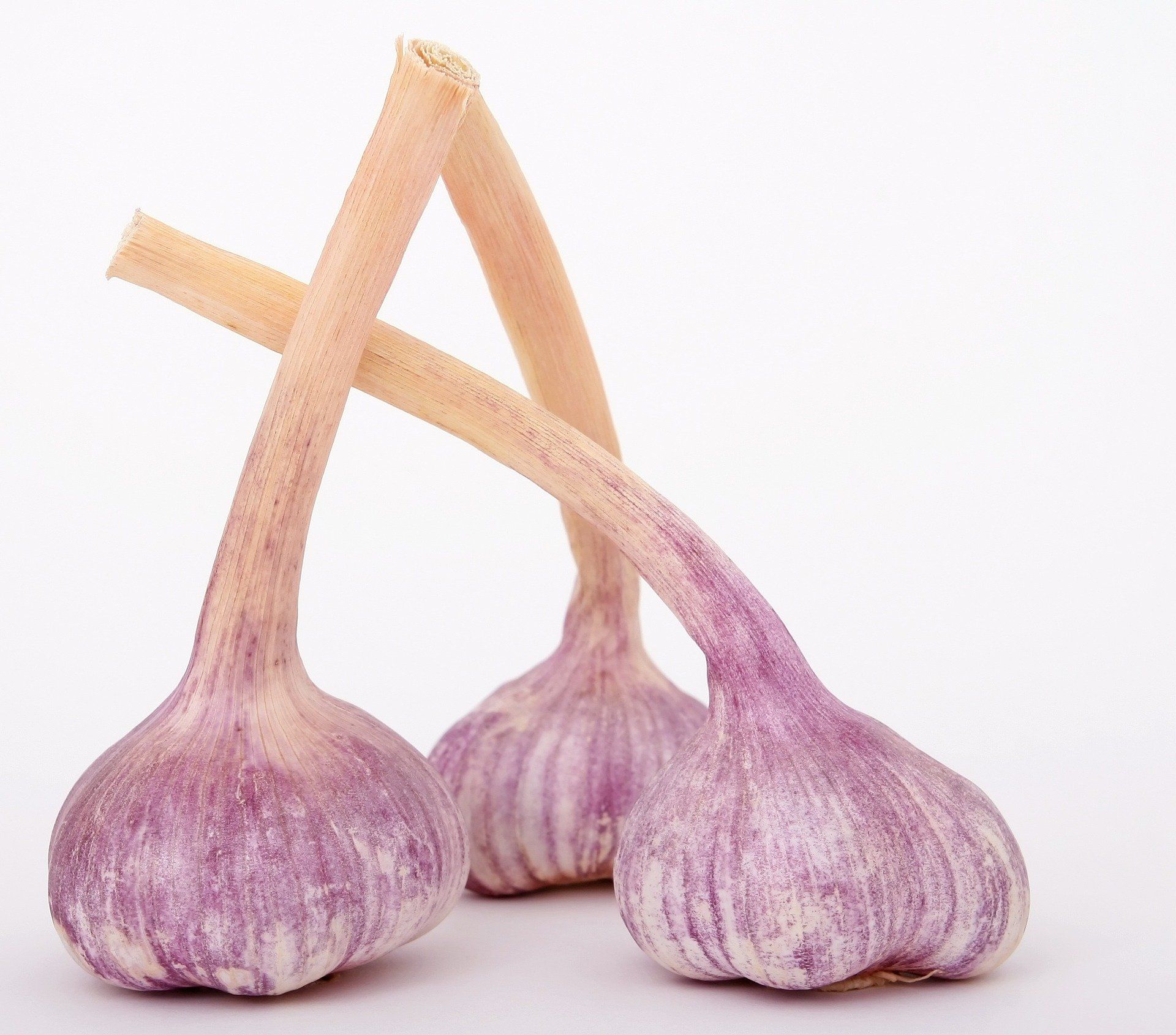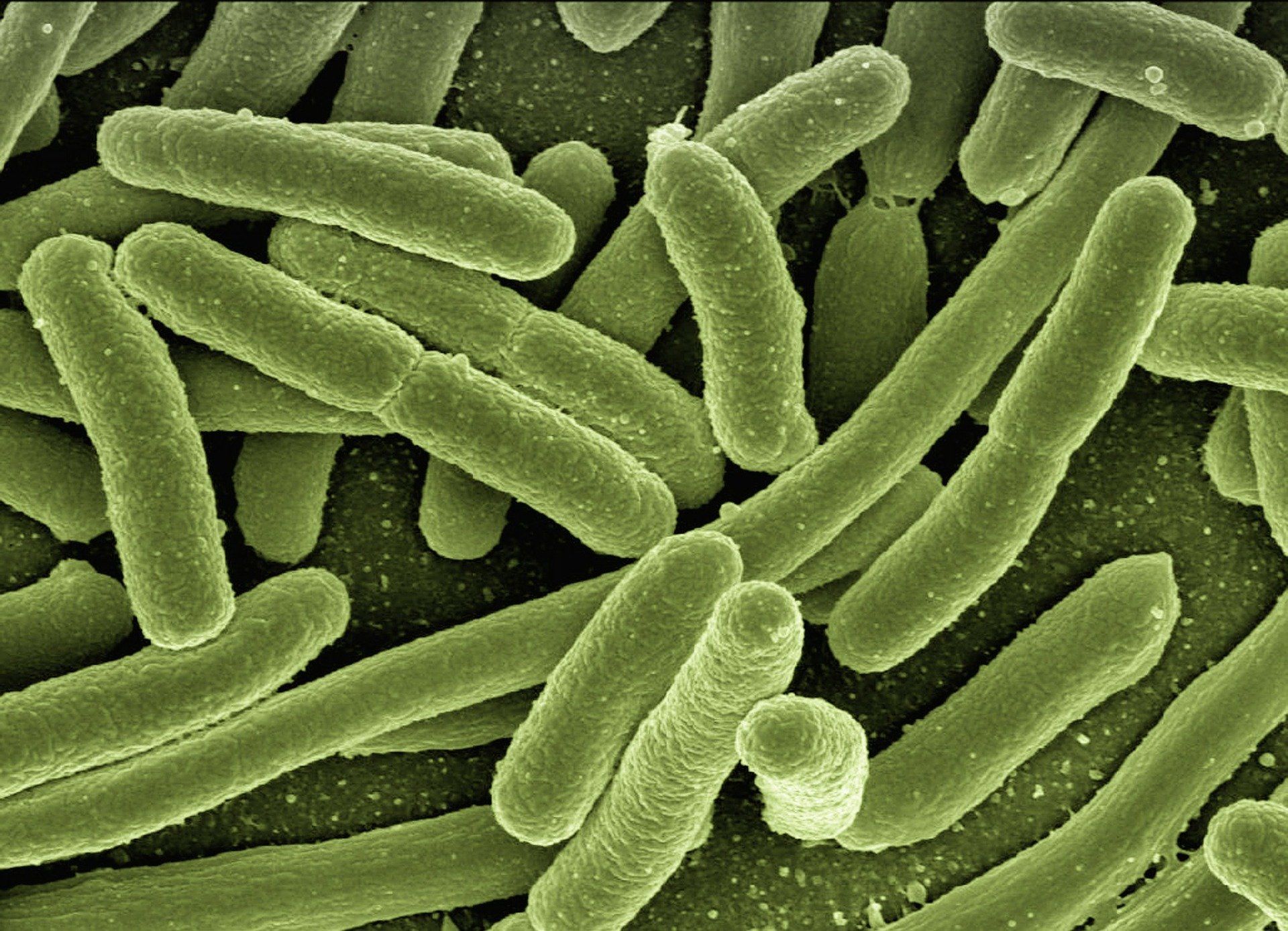
Ingredients:
- Vitamin C
- Vitamin E
- Zinc
- Probiotics
- Herbal powders
Benefits:
- Antioxidant support*
- Supports a healthy immune system*
- Contains 10 immune-supporting ingredients*
Serving size:
- Two capsules daily
- One month supply
Special offers:
- Buy 2 or more, get 10% off!


Slide title
Write your caption hereButton
Slide title
Write your caption hereButton
Slide title
Write your caption hereButton
Slide title
Write your caption hereButton
Slide title
Write your caption hereButton
Slide title
Write your caption hereButton
Slide title
Write your caption hereButton
Slide title
Write your caption hereButton
About this formulation: Why is it helpful?

Your immune system is your body's built-in protection mechanism against foreign invaders like viruses, bacteria, parasites, and fungi. You might get sick if the system is weakened. For this reason, you should work to strengthen your immune system.
This product contains 10 helpful vitamins, minerals, probiotics and herbal extracts to support your immune system.
1. Elderberry fruit extract
- The dark purple elderberry (Sambucus nigra) is a fruit that grows on European elder trees. It has been used to help people in colds and flu. It also has an impact on the immune system. Elderberry stimulates cytokines, which have the immunomodulatory properties.
- Vitamins A, B, and C are among the immune-supporting antioxidants found in elderberries. (1)
- Elderberries are a high antioxidant, low calorie meal (2).
- Elderberry is a rich source of dietary fiber and could help improving gut conditions. (3)
- Elderberry is a source of the anti-oxidant flavonols e.g. quercetin, kaempferol, and isorhamnetin. (3)
- Elderberry contains anthocyanins, a powerful antioxidant. (3)

2. Vitamin C
- Vitamin C promotes neutrophils migration, helps phagocytosis and oxidant production. Vitamin C is also a powerful antioxidant and aids in the defense of cells against free radicals. (4)
- Numerous stress-related diseases are correlated with a vitamin C deficiency. Maintaining vitamin C levels might be a good indicator of general health. (5)
- Some researches suggest that vitamin C can help in cold. (5, 6, 7)
- Research published in the American Journal of Clinical Nutrition, found that higher vitamin C intakes were associated with fewer wrinkles and better skin. (5)
3. Echinacea
- The benefits of echinacea on the immune system are best known. This plant supports your immune system and may speed up your recovery. Three mechanisms of activation of phagocytosis, stimulation of fibroblasts, and enhancement of respiratory activity are probable mechanisms of Echinacea. (8, 9, 10)

4. Vitamin E
- Vitamin E may have a role in T cells metabolism (cells involved in immune responses) through its direct effects on the cell membrane integrity, signal transduction, and cell division; as well as its indirect effects on the inflammatory mediators produced by other immune cells. (11)
- Vitamin E is an anti-oxidant. (12)
Precautions:
- Vitamin E and other antioxidants may interfere with chemotherapy and radiation treatment. Patients should see their doctor or oncologist before taking dietary supplements. (13)
- Patients taking Anticoagulant and Antiplatelet medications should consult their doctor (13)
5. Garlic powder
- According to the reliable literature, Garlic has been shown to support the immune system. Garlic extract works as an antioxidant by scavenging reactive oxygen species (ROS) and boosting cellular antioxidant enzymes like glutathione peroxidase, superoxide dismutase, and catalase. (14, 15)
- Allicin is a chemical that is produced when raw garlic is crushed and so, the Garlic powder has proven to provide better effects. (16)

6. Vitamin B6
- The body's ability to utilize proteins, lipids, and carbohydrates requires vitamin B6. Additionally, it's essential for the growth of the skin, nerves, brain, and several other body organs. (17)
- The generation of T cells and interleukins, which are powerful mediators of the inflammatory response in immunological and vascular cells, is significantly influenced by the vitamin B6. (18)
- Vitamin B6 is required for the biosynthesis of neurotransmitters including serotonin, dopamine, and gamma-aminobutyric acid (GABA), which control emotions. (19)
- Vitamin B6 is important in the biosynthesis of hemoglobin. (19)
- Vitamin B6 may be helpful in lowering homocysteine levels in the blood (19, 20)
7. Turmeric
- Turmeric, a well-known spice, is obtained from the root of the Curcuma longa plant. Turmeric contains Curcumin, which is an antioxidant agent. (21)
- Curcumin may destroy free radicals, limit free radicals effects, and may enhance the action of other antioxidants. (22)
- Curcumin may help decreasing several molecules known to play significant roles in inflammation. (22)

8. Zinc
- Multiple components of the immune system are impacted by zinc. Neutrophils, natural killer cells, and macrophages—cells that mediate innate immunity—all require zinc for appropriate growth and operation. Zinc is required for the processes of phagocytosis, intracellular death, and cytokine synthesis. The development and operation of T and B cells are negatively impacted by zinc deficiency. Zinc's capacity to act as an antioxidant and a cell membrane stabilizer helps reducing the side effects of produced free radicals during inflammatory processes. (23)
Precautions:
When taking quinolone or tetracycline antibiotics with a zinc dietary supplement, the body absorbs less zinc and less antibiotic. This impact can be reduced by taking the antibiotic at least two hours before or four to six hours after taking a zinc dietary supplement. (24)
9. Lactobacillus acidophilus
- Your intestines contain a type of bacteria called Lactobacillus acidophilus. It’s a member of the Lactobacillus genus of bacteria, and it plays an important role in human health by limiting or reducing the growth of dangerous microorganisms in the gut by producing lactic acid. (25, 26)
- It may also help in lactose intolerant patients. (27)

10. L- Glutamine
- L-Glutamine is a form of glutamine which is an essential amino acid. The immune system is where glutamine plays one of its most crucial roles. Immune cells, such as white blood cells and some intestinal cells, depend on it as a vital fuel source. For these reasons, after severe injuries, high-glutamine diets, or glutamine supplements are frequently recommended. (28)
- L-glutamine improves general health by promoting digestive and intestinal processes and preserves a healthy immune system. (29, 30)
References (2022-08-31):
1. https://www.insider.com/guides/health/diet-nutrition/elderberry-benefits
2. https://www.healthline.com/nutrition/elderberry#risks-and-side-effects
3. https://www.healthline.com/health/elderberry-for-flu#other-health-benefits
5. https://www.webmd.com/diet/features/the-benefits-of-vitamin-c
6. https://ods.od.nih.gov/factsheets/VitaminC-Consumer/
7. https://medlineplus.gov/ency/article/002145.htm
8. https://www.healthline.com/nutrition/echinacea#bottom-line
10. https://www.medicalnewstoday.com/articles/252684#uses
12. https://medlineplus.gov/ency/article/002406.htm
13. https://www.healthline.com/health/all-about-vitamin-e#The-bottom-line
14. https://www.healthline.com/health/hiv-aids/garlic#benefits-of-garlic
16. https://www.healthline.com/nutrition/garlic-for-blood-pressure#how-it-works
17. https://medlineplus.gov/druginfo/natural/934.html
19. https://www.healthline.com/nutrition/vitamin-b6-benefits#TOC_TITLE_HDR_13
20. https://ods.od.nih.gov/factsheets/VitaminB6-Consumer/
21. https://www.ncbi.nlm.nih.gov/pmc/articles/PMC5664031/
24. https://ods.od.nih.gov/factsheets/Zinc-Consumer/
25. https://www.verywellhealth.com/acidophilus-and-other- probiotics-88321
26. https://www.ncbi.nlm.nih.gov/pmc/articles/PMC2967272/
27. https://www.healthline.com/nutrition/lactobacillus-acidophilus#TOC_TITLE_HDR_9
28. https://www.ncbi.nlm.nih.gov/pmc/articles/PMC6266414/
29. https://draxe.com/nutrition/l-glutamine-benefits-side-effects-dosage/
30. https://www.healthline.com/nutrition/glutamine#TOC_TITLE_HDR_4
* These statements have not been evaluated by the Food and Drug Administration.
Products are not entitled to diagnose, treat, cure or prevent any disease.
The information provided in this website is intended for general informational purposes only and is not intended as medical advice. The content of this website is based on research and sources believed to be reliable, but it is not a substitute for professional medical advice, diagnosis, or treatment.
The authors and publisher of this website are not responsible for any adverse effects or consequences resulting from the use of the information presented herein. Readers should consult their healthcare professionals before making any dietary changes or starting any new health regimen, especially if they have any pre-existing medical conditions or are taking any medications.
The statements made regarding specific foods, ingredients, or dietary approaches have not been evaluated by the Food and Drug Administration or any other regulatory body. The information provided in this website is not intended to diagnose, treat, cure, or prevent any disease.
Individual results may vary. The benefits of foods discussed in this website may not be experienced by all individuals, and the effectiveness of any dietary recommendations may depend on factors such as individual health, genetics, lifestyle, and adherence to the recommendations.
The reader assumes full responsibility for any actions taken based on the information provided in this website. The authors and publisher disclaim any liability or loss in connection with the use of the information contained in this website.
It is always recommended to seek the advice of a qualified healthcare professional for any questions or concerns related to one's health.